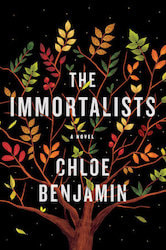
When I first heard the premise for The Immortalists, my fear was that it would be a fantasy story or that it would just prove cheesy. But it’s so not either of those things. This novel is going to end up on a lot of “Best-of-the-Year” lists in eleven months. And while it’s still just January and I have a slew of books ahead of me in 2018, I suspect it will be in the running for my favorite of the year, too. With my last two years’ picks being Yaa Gyasi’s Homegoing and Min Jin Lee’s Pachinko, that’s pretty terrific company.
The novel begins in 1969 New York. Four young siblings are bored during summer break and one of them hears that a fortune-teller is in the neighborhood, a woman who can tell each person the precise date of his or her death. The siblings go, hear the news and go on about their summers. The story then picks back up years later.
Only it’s not that simple. Even though they don’t really talk about these prophecies, hearing the dates they are to die changes each child in different ways. The remainder of the novel tracks each of the four siblings into adulthood, and we see how having such a prophecy about their lives affects the choices they make.
The first two sections are devoted to the two youngest of the siblings, and their sections are fascinating. After the emotional impact of those sections, however, my fears about it getting cheesy came back because the remaining two sections can’t just follow the pattern of the first two, can they? And no, they can’t. Benjamin has some more fascinating twists and stories for us in the remaining two parts.
I don’t want to reveal anymore because… spoilers… but it’s so well done. It’s a story about fate, free-will, family, guilt, faith and the lack of it, and there’s always an intellectual element of suspense that makes it a page-turner. If you give this one a go I think you will be enthralled.
The novel begins in 1969 New York. Four young siblings are bored during summer break and one of them hears that a fortune-teller is in the neighborhood, a woman who can tell each person the precise date of his or her death. The siblings go, hear the news and go on about their summers. The story then picks back up years later.
Only it’s not that simple. Even though they don’t really talk about these prophecies, hearing the dates they are to die changes each child in different ways. The remainder of the novel tracks each of the four siblings into adulthood, and we see how having such a prophecy about their lives affects the choices they make.
The first two sections are devoted to the two youngest of the siblings, and their sections are fascinating. After the emotional impact of those sections, however, my fears about it getting cheesy came back because the remaining two sections can’t just follow the pattern of the first two, can they? And no, they can’t. Benjamin has some more fascinating twists and stories for us in the remaining two parts.
I don’t want to reveal anymore because… spoilers… but it’s so well done. It’s a story about fate, free-will, family, guilt, faith and the lack of it, and there’s always an intellectual element of suspense that makes it a page-turner. If you give this one a go I think you will be enthralled.
 RSS Feed
RSS Feed
